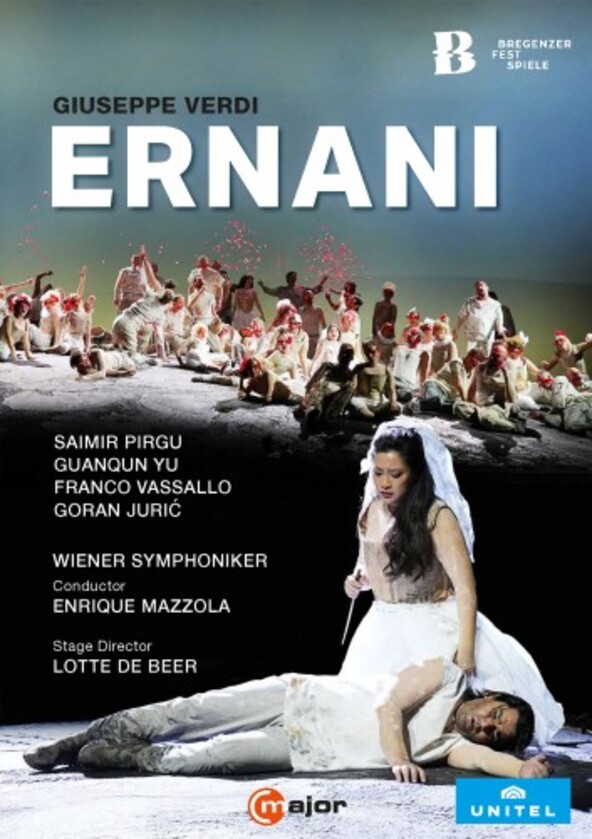VERDI Ernani (Mazzola)
View record and artist detailsRecord and Artist Details
Genre:
Opera
Label: C Major
Magazine Review Date: 01/2025
Media Format: Digital Versatile Disc
Media Runtime: 121
Mastering:
DDD
Catalogue Number: 768108

Tracks:
| Composition | Artist Credit |
|---|---|
| Ernani |
Giuseppe Verdi, Composer
Aytaj Shikhalizada, Giovanna, Mezzo soprano Enrique Mazzola, Conductor Franco Vassallo, Don Carlo, Baritone Goran Juric, Don Ruy Gomez da Silva, Bass Guanqun Yu, Elvira, Soprano Omer Kobiljak, Don Riccardo, Tenor Prague Philharmonic Choir Saimir Pirgu, Ernani, Tenor Stanislav Vorobyov, Jago, Bass Vienna Symphony Orchestra |
Author: David Patrick Stearns
Verdi’s Ernani? Or the Brad Pitt movie Fight Club? This new DVD sounds like the former but looks like the latter, with a first-scene chorus of fit, shirtless, scrappy men invading the stage and waking up the title character. Video director Tiziano Mancini doesn’t linger over the eye candy (some from an acrobatic group called Stunt-Factory) but zeroes in on the less-than-comprehensible story at hand. Even with good early-period Verdi music, it’s an opera that seems always to need redemption. The celebrated revisionist Dutch stage director Lotte de Beer would seem to be the one to do that and succeeds as often as not, which means it’s an interesting try but not the rehabilitated Ernani that would draw the opera’s admirers away from the traditional if dated DVDs with brand names such as Plácido Domingo (Kultur/NVC Arts) and Luciano Pavarotti (Decca).
Once Verdi’s most popular opera, the 1844 Ernani only makes sense as something written according to what was then the standard playbook, must be accepted for being formulaic and is most convincing when the emotional heat is turned high enough to achieve logic-defying universality. The story has three men – each in succeeding generations in this production – vying for the magnetic Elvira, all in fragmentary costumes suggesting underwear or, if nothing else, a conspicuous lack of outerwear. Thus, the characters aren’t motivated by garments indicating social-class entitlement but, in the cases of Silva and Carlo, various shades of vanity and aggression.
Ernani, ever the virtuous warrior, has a breastplate (the most concrete costume on stage) and Elvira is in a fragmentary wedding dress much of the time. Among her suitors, the crown-wearing Carlo is in a body suit revealing a midriff spare tyre suggesting his complaisance. The infirm Silva hobbles on a walker. We know which one will win Elvira (Ernani), though he’ll pay with his honour-related suicide. Each character represents a political faction that comes with aggressive supporters – one faction making a surprise entrance by bursting through the rear wall. De Beer’s stated intention in the booklet notes is to make audiences uncomfortable, and she does that in Act 2 when Silva is blindfolded and beaten by Carlo’s men – relevant in this age of bullies.
Most importantly, de Beer has given deft attention to moment-by-moment character relationships. But every so often, you stand back and realise you’re looking at an incongruous stage resembling a low-budget costume party. Yet there are other stage pictures, thanks to designer Christof Hetzer, that achieve eloquent simplicity – which reads best on video. One is the Charlemagne graveyard scene, with its moody use of shadows.
Singing is what makes any Ernani recording or video, and conductor Enrique Mazzola lays a taut, solid foundation with a Verdian sensibility to the often expansive phrasing. The problem is that the cast is in an acoustical environment that encourages them to oversing. Guanqun Yu (Elvira) is the star voice, a mid-weight Verdi soprano with the power to stand up to the male characters and with a beauty reminding you why she is desirable. The passagework is good (and would be better were she not singing out). But she has a good effect on her co-stars: the Act 2 duet with Ernani draws some of the best singing from co-star Saimir Pirgu, who sounds a bit war-weary elsewhere. The harder he pushes, the more unfocused his tenor voice becomes. He still gives an overall stentorian impression but the pitch and vibrato problems do get in the way.
Robust-voiced Franco Vassallo (Don Carlo) has no such consequences from forte singing, though his Act 3 ‘Oh, de’ verd’anni miei’ would be so much more effective with a cultivated sense of light and shade. As the aged Silva, Goran Juric´ sings with just enough vocal wobble to match the limited mobility of his character in this production. In some ways, he is the cast’s most memorable presence, hoping for love in the beginning and drinking poison at the end.
Discover the world's largest classical music catalogue with Presto Music.

Gramophone Digital Club
- Digital Edition
- Digital Archive
- Reviews Database
- Full website access
From £8.75 / month
Subscribe
Gramophone Full Club
- Print Edition
- Digital Edition
- Digital Archive
- Reviews Database
- Full website access
From £11.00 / month
Subscribe
If you are a library, university or other organisation that would be interested in an institutional subscription to Gramophone please click here for further information.




